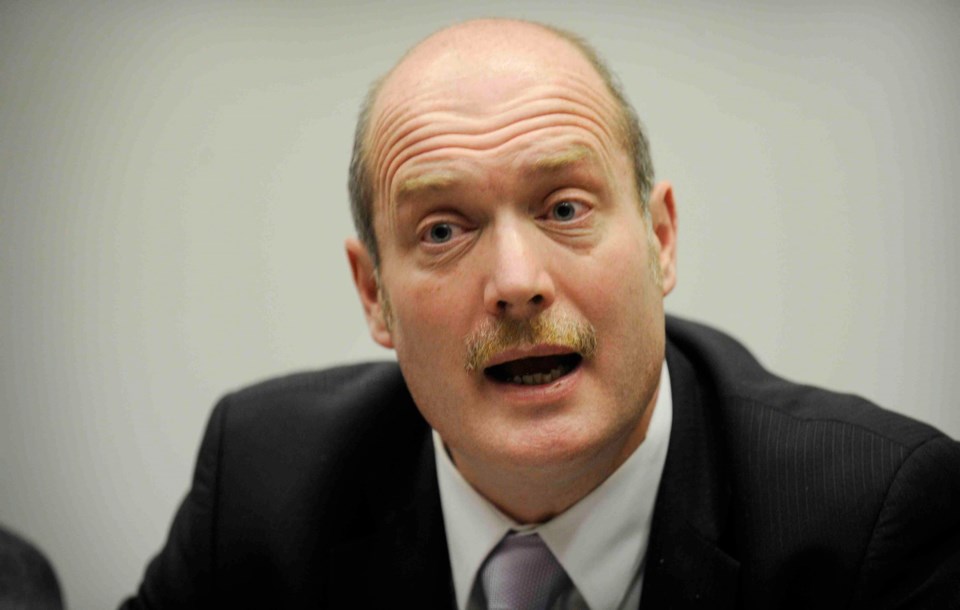 A little bit of bad news wouldn’t have been out of line as far as Finance Minister Mike de Jong was concerned Tuesday as he delivered a quarterly update on the B.C. budget.
A little bit of bad news wouldn’t have been out of line as far as Finance Minister Mike de Jong was concerned Tuesday as he delivered a quarterly update on the B.C. budget.
A couple of downturns in some trend lines, a bit of revenue drop-off and he could have pontificated about austerity, stark choices and the need for vigilance on spending, with the whole sermon aimed at the B.C. Teachers’ Federation.
But the news wasn’t that bad at all. The snapshot of the budget for the first three months of the fiscal year shows revenues are up, debt is down and the estimated surplus is growing slightly. The provincial economy is holding to the post-meltdown standard, “stable but not spectacular.”
By de Jong’s reckoning, though, the generally positive report card in no way creates leeway for a fresh influx of cash to settle the school strike.
STRIKE NOTES: Updates for those affected by B.C.’s dispute with teachers
“The money is there for admittedly modest wage increases,” he said. “It’s not there for two times the amount others are getting, and the cascading effect that would have on other negotiations.
“To break the bank and let it all ride for the sake of one group ignores the risk that represents to taxpayers and the principle of fairness that we think is very important.”
De Jong said “billions of dollars” is at stake if BCTF demands were met and comparable offers were then required at other public-sector bargaining tables.
One of the several tiresome games being played by both sides involves reconfiguring the numbers to buttress each sides’ case.
BCTF president Jim Iker said the teachers’ demand is “very affordable. It’s $3 a day per student, over a five-year term.”
Three dollars doesn’t sound like much, if you overlook the fact there are more than 550,000 students in B.C. And five years is a lot of days.
Iker compared it to “giving $750 million to a California power company,” which was a settlement of a complicated horror story that was to avoid an even higher penalty.
De Jong’s version of the game is to invent dramatic tax implications that would alarm anyone who takes him seriously. Meeting BCTF demands would raise gas taxes five cents a litre (if the entire cost were paid for from one single tax source, which is lunacy). Or $200 on the average property tax bill (on the same far-fetched assumption).
He said his outline was just to break large numbers down into more understandable bits. But it’s also a bit of overplaying to balance Iker’s underplaying, which leaves bemused taxpayers as frustrated as ever.
Iker was asked if a deal could be reached without a tax hike and responded: “Absolutely.”
He’s probably right, it could. If the government took an axe to a fair chunk of spending in other areas to make up the costs.
De Jong’s presentation of a reasonably good financial picture (the surplus estimate is upgraded to $266 million from $184 million) raises the question of using it, strike savings and contingency funds to sweeten the pot.
He discounted the idea heavily. One, the expectation of a higher surplus is the product of a number of variations in revenue and spending in just one quarter of the year.
“Much of what you see in the additional surplus is one-time money that won’t be available next year.”
Two, even the higher number is still a fractional surplus on a $44-billion budget.
Three, it would amount to a double-cross of the other public-sector unions who have settled.
“We sit down with other labour organizations and they bargain hard,” said de Jong, “and it comes to the point where you look across the table and you strike a deal and that representative who has negotiated hard for his or her members says: ‘Now, I want to know that you guys are treating us fairly and you’re not going to give someone else twice as much or three times as much.’ We take that obligation seriously.”
Just So You Know: In the midst of the stalemate, the government has found $66 million to cover a liability in the teachers’ pension plan. It’s jointly administered, meaning the BCTF has to do the same.



